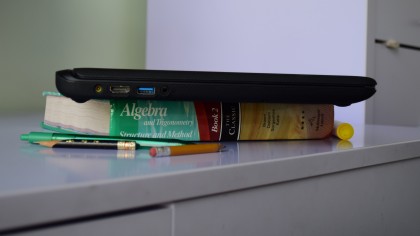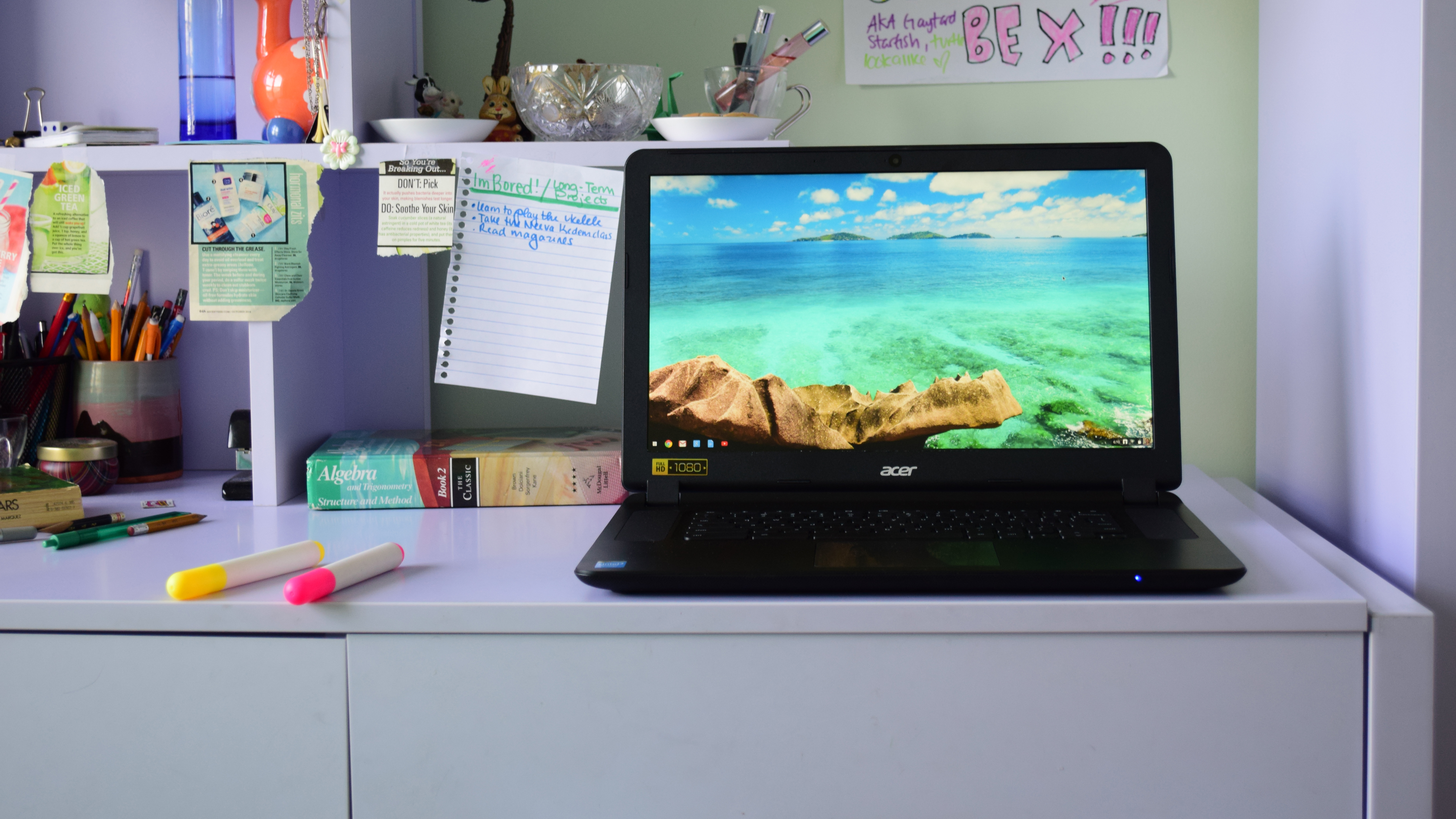Why you can trust TechRadar
There are areas in which Acer perfectly utilizes space and weight. For example: Acer neatly slides several ports and inputs into its slight one-inch height.
This will definitely come in handy for young kids and parents who might not be tech-savvy enough to connect Bluetooth and Wi-Fi devices. (Let's not even talk about how they're to prepare themselves for the USB-C revolution that the Pixel and MacBook are leading.)

Spec sheet
Here is the Acer Chromebook 15 C910 configuration given to TechRadar for review:
- CPU: 2.2GHz Intel Core i5-5200 dual-core processor
- Graphics: Intel HD 5500 Graphics with shared memory
- RAM: 4 GB, DDR3L SDRAM
- Screen: 15.6-inch full HD (1,920 x 1,080)
- Storage: 32GB SSD
- Ports: HDMI, 1 USB 2.0, 1 USB 3.0
- Connectivity: 802.11a/b/g/n/ac Wi-Fi
- Camera: 720p HD webcam
- Weight: 4.85 pounds
- Size: 1.0 x 15.1 x 10.1 inches (H x W x D)
Acer made waves when it first installed Broadwell processors in its Chromebook lineup. These processors are faster and more energy efficient than the Celeron processors you'll typically find on Chromebooks. This addition essentially elevated the Chromebook class from a group of notebooks only suited for light use to devices that could be used to get a little work done.
Now, this doesn't necessarily mean you'll want to use the C910 as your primary computing device. It just doesn't have enough local storage capacity to house all of your photos, music and documents.
However, in order to lure people to the Chrome operating system, Google is giving away one terabyte of free cloud storage to any new Chromebook buyer. So, if you're comfortable keeping all of your information in the cloud, you should be able to get by using this device without any additional storage hardware.
Performance and features
When comparing the performance of the C910 against the Pixel and the HP Chromebook 14, it's important to note the difference in processors. The Google Pixel 2 features a similar Intel Core i5 processor to the one under the C910's hood, while the HP Chromebook 14 features a previous generation Intel Celeron 2955U Haswell processor.
Sign up to the TechRadar Pro newsletter to get all the top news, opinion, features and guidance your business needs to succeed!
This makes a huge difference in how these units perform in benchmark tests, which will in turn reflect how they perform in day-to-day use. (Note: the Pixel can be outfitted with an i7 processor, which will dramatically improve performance compared to what I reference below).
Benchmarks
Here's how the C910 performed in our suite of Chromebook benchmark tests:
- Octane: 25,240
- Mozilla Kraken: 1,301.5
- Sunspider: 192.5
When compared to the Pixel 2, the C910 narrowly edges out the more expensive, more talked about Google notebook. In the Octane benchmark, which measures a JavaScript engine's performance, the Pixel 2 received a 24,564 during testing performed by other outlets.
The C910 outperformed the Pixel 2 during the Mozilla Kraken test, which also measures speed by pushing a device's JavaScript engine, by achieving a score of 1,301.5 compared to the Pixel's 1,428 (a lower score is better during the Kraken test). In our final JavaScript test, Sunspider, the C910 once again outscored the Pixel 2, with a 192.5 score compared to the Pixel 2's 298 (lower is better).
The head-to-head between the HP Chromebook 14 and the C910 wasn't even close. For all three tests (Octane: 11,735, Kraken: 2,615, Sunspider: 375), the HP Chromebook was nearly twice as slow as the C910. This isn't a fair comparison – it's obvious a Broadwell i5 processor is going to run laps around a Haswell Celeron processor. However, because these are the two largest devices in the Chromebook class, it's important that we show you what you're getting when you opt for the bigger screen.
In terms of real life performance, the C910 doesn't disappoint. I was able to perform a similar set of browser-based tasks on the Chromebook that I would typically run on my MacBook Pro. However, my MacBook houses almost 20,000 photos and god-only-knows how many programs I've downloaded.
This Chromebook won't be able to do that for you. But, if you're storing everything in the cloud, which you should be doing anyway, and you're just using this notebook to browse the web and word process, then you'll love the C910's performance.
Battery life
The school day will be no match for the C910. This bad boy was able to crank out a whopping eight hours and 48 minutes of continuous video playback with the volume and screen brightness set at 50%. That's not quite the 10 hours of performance promised by Acer, but it's pretty darn close.
When compared to the Pixel 2, the C910 slightly loses its edge. Our reviewer was able to push the Pixel for eight hours and 22 minutes during a more extreme test in which he set the screen brightness to 50% while tabbing between 20 webpages, listening to Google music and streaming a two-hour movie on Netflix. The C910 won't be able to last that long under the exact same pressure, but it will likely get you past the seven-hour mark.
